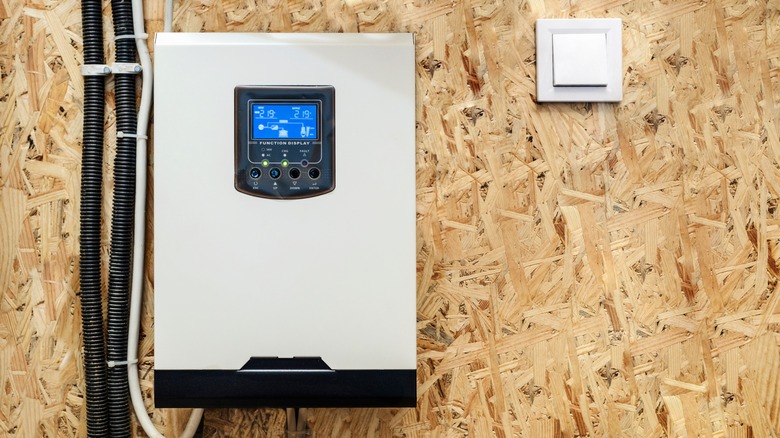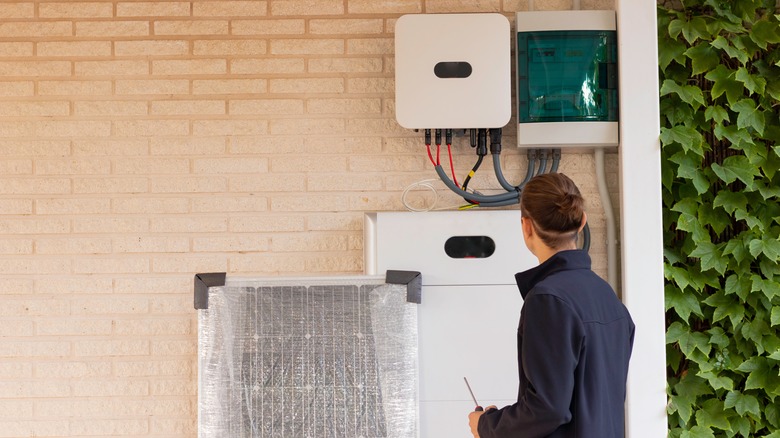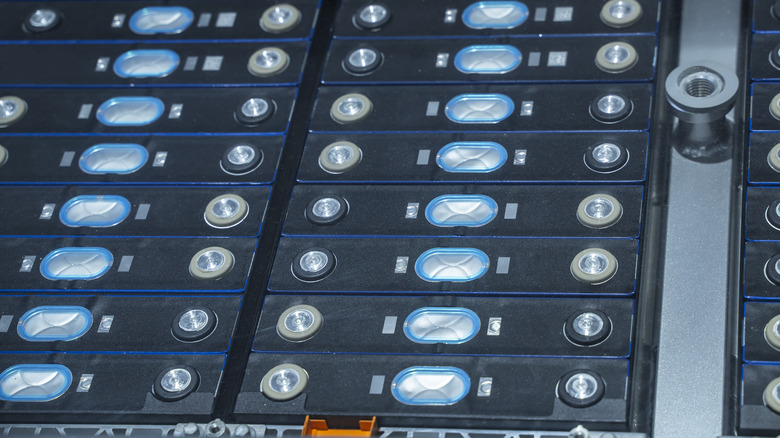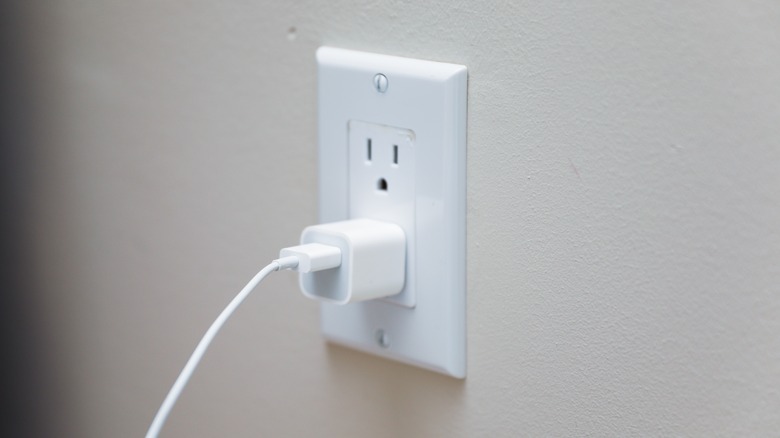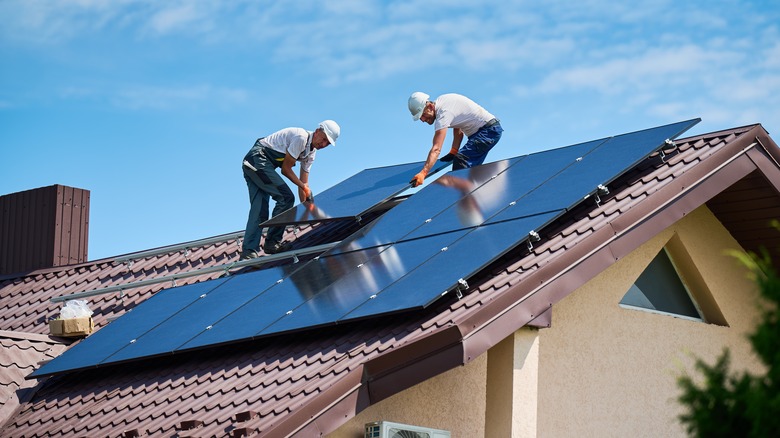What To Consider Before Installing A New Home Battery
Slowly, but surely, the world is moving away from traditional fossil fuels and transitioning into a renewable, battery-powered future. It's not a fast or pleasant transition, but it is an important one, and even putting aside the environmental benefits, it can have all kinds of small perks for your daily life. For instance, if you're looking to offset your power bills and shore up your home against the occasional grid disruption, installing an internal battery system in your home is an excellent idea.
Hooking up a battery framework to a set of solar panels on your home, as well as drawing from the grid when power prices are low, gives you an extra source of juice you can rely on either on an average day or when your usual supplier is experiencing an interruption. However, installing a battery system in your home isn't as simple as popping some D-cells into a flashlight. There's an entire checklist of questions and quantifiers you need to go through ahead of time, including how much power capacity you need, the kind of battery you should use, and whether or not you actually have a spot to stick the whole thing.
Do you have a good place to put a battery station?
Before you can even consider purchasing a battery for your home, you first need to take a good look around for an ideal spot to install it. A battery system isn't like a portable generator, which you could just keep in a closet until you need it. It needs a dedicated spot in a safe place where it can manage itself, as well as be accessible should the need for maintenance arise.
Firstly, a battery station needs to be placed in a sheltered, indoor location. This is definitely not the kind of thing you want to have exposed to the elements, unless you want pests chewing on its wires. More importantly, the place you put it should have at least a basic level of temperature control. Battery stations have a very particular operational temperature range, and if it's too hot or too cold, it may impact its ability to safely regulate and distribute power. A garage is usually your best bet, though a shed could also work, so long as it's insulated and sufficiently close to your home. In a pinch, you could install the system inside your home proper. Just make sure you find somewhere out of reach of children or pets.
What kind of battery should you get?
As part of efforts to create new and effective battery frameworks, a variety of different battery types have made themselves known across the industry. These batteries aren't just for powering your remote control or your EV; the same kinds of technology can be hooked up to your home grid to store and distribute power. However, the kind of battery you should get depends heavily on what you'll be using it for and how much you've got to spend.
Two of the most prominent battery types are lead-acid and lithium-ion. Lead-acid batteries are one of the oldest battery types, roughly synonymous with the battery in your car or simpler disposable batteries. Since lead-acid battery tech is so well-established, it's one of the cheaper kinds of batteries you can get, and is generally compatible with most systems. However, lead-acid batteries don't last as long as their competitors, often requiring replacement after just a few years.
By contrast, lithium-ion batteries are the newer hotness, used in powering newer technology like EVs. They're smaller and lighter than lead-acid, and have a generally longer lifespan. Of course, better technology means bigger price tags, required specialized equipment, and some other concerning problems.
It's worth noting that there are two other major forms of battery: nickel-cadmium and flow batteries. Technically, both of these battery types could hold large quantities of power for a long time. However, both are too expensive to realistically consider for a residential installation, and in the case of nickel-cadmium, they contain potentially toxic chemicals that definitely wouldn't be safe to have around.
How much power do you need?
The entire reason you'd want to equip your home with a battery system is to have a reliable source of supplemental power in the event of a power outage, whether it be due to a small random outage or a more severe situation. However, as nice as it would be to have access to enough energy to seamlessly power every single outlet in your home indefinitely, such a thing simply isn't feasible, at least not yet. As such, when considering installing a battery system in your home, you need to consider where the power needs to go when it's on, and how much you'll actually need.
Take a look around your home and consider which appliances will definitely need power in an emergency situation; for instance, you'll probably want to ensure your refrigerator receives power, so your food doesn't go bad. Or, if any of your family members need medical equipment, their respective outlets will definitely need to be powered. If you happen to have user manuals for those devices, you can get a solid number for the necessary voltage, but if not, try checking your most recent utility bill. You may be able to determine which rooms in your home are drawing the most power on an average day and make an educated guess about how much power your battery would need to divert to the critical spots.
Would a new battery be compatible with your existing system?
There are a lot of very old homes around the United States, some of which had their original electrical systems installed decades ago. Unfortunately, if your home is very old and the wiring hasn't been updated in a long time, it may not be compatible with a modern battery system, at least not without extensive and expensive tinkering. If you're not sure how long ago your home's electrical framework was set up, check your records for any information on when the house was built or modified. You can also call up an electrician to give the place a once-over and determine how much of an undertaking any modern modification might be.
Even if your home was built fairly recently or already has modern technology like a solar panel setup installed, it might still be tricky to get a new battery installed. If your system was built using any kind of proprietary connectors, especially those that may no longer be in use by the industry at large, an electrician would need to jump through a few hoops to get the entire thing safely squared away.
